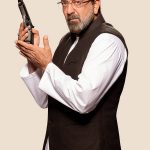There was a time when the films produced by the Deols under their home banner of Vijayta Films (or now under Sunny Sound) were known for their superlative music. ‘Betaab’ (R.D Burman), ‘Barsaat’ (Nadeem – Shravan), ‘Dillagi’ (Jatin-Lalit, Shankar-Ehsaan-Loy, Anand-Milind and Sukhwinder Singh), ‘Socha Na Tha’ (Sandesh Shandilya) boasted of some fine music. The music of their last couple of productions (‘Chamku’, ‘Yamla Pagla Deewana’ series, ‘Ghayal Returns’) has not really been up to the mark but with Sunny Deol launching his son Karan and Sahher Bambba in ‘Pal Pal Dil Ke Paas’, a youthful love story, one expects a good score in the offering. Sachet-Parampara, who have delivered one of the biggest hit songs of the year in “Bekhayali” (‘Kabir Singh’) have put together almost the entire album and one song has been contributed by Tanishk Bagchi.
The album opens with what is perhaps the most unconventional song on the soundtrack. “Aadha Bhi Zyaada” has a carefree and vagabond-like vibe to it. Hansraj Raghuwanshi, who is a well-known name in Himachal Pradesh and is popularly known as ‘baba ji’ among the people who follow his music, to sing this track. It was a good decision on the part of Sachet-Parampara to get a local talent to sing this song as several references (“dev bhoomi ki yeh maaya”) to Himachal Pradesh are used in it. Though Karan Deol is credited with rendering the rap portions the lines uttered by him (1:42), can barely be categorised as rap.
Sachet-Parampara composed the ‘star song’ of the ‘Kabir Singh’ album. “Bekhayali” was easily the most popular song from the album and in this album, the ‘star song’ is definitely “Pal Pal Dil Ke Paas”, the title track. Just like “Bekhayali“, this one, too, registered a strong impression in the teaser/trailer itself when one got to see (or rather hear) only a small glimpse of the song. From the tune to the singing (Arijit Singh and Parampara Thakur) to the wonderful lyrics which are an amalgamation of Hindi and Punjabi words, everything about the song is bound to strike a chord with the listener. There are three more versions (“Celebration”, “Version 2” and “Sun Le Rab”) of the song. In “Version 2”, Sachet replaces Arijit as the male vocalist; rest everything remains the same. In the “Celebration” version, there is a bit of dubstep element thrown in for good effect. “Sun Le Rabb” is a short, sad version of the song.
Tanishk Bagchi leaves a solid mark with “Ho Jaa Awara”, his sole contribution to the album. The song spells freedom and rebellion in loud, clear words. Both Monali Thakur and Ash King do a very good job at bringing the vivaciousness and the spunk in the song come to the fore. However, it is Monali who brings alive the lively words written by Siddharth – Garima in the uninhibited way she expresses herself through the song. The song is picturised in the mountains, where a large part of the film is set in, and that is evident in the audio track as well. Tanishk incorporates some interesting ambient sounds which register the fact about the lead pair travelling across the mountains while crooning this song.
“Ishaq Chaliya” is a dance number but if you play this song expecting it to sound anything like the kind of dance based tracks you have listened to in the recent past, you are in for a surprise as it does not sound anything like those songs – which is actually a good thing! The track starts with a retro-inspired sound and then, within a few seconds, you get an idea of what this song is all about. The song has an upbeat rhythm befitting a dance number but at the core of it lies an amorous melody that makes an impression with the very first listening. Sachet and Parampara, apart from composing the track, have lent their voices to it and they do a good job both as composers and singers.
Though both Sachet and Parampara’s voices are heard in “Dil Uda Patanga”, it is Parampara who leaves a larger impression with the way she brings to the fore the feelings of a young woman who has recently discovered what it feels to be in love. Sachet’s slightly anglicised singing does not really sit well with the song. Also, most singers, these days, miss out on pronouncing ‘na’ at the end of several words (“hain” as “hai”). Just like the title track, Siddharth and Garima write a couple of verses in Hindi and Punjabi and this is definitely one of the best written songs on the album.
Parampara continues to impress as a vocalist with her rendition of “Maa Ka Mann” which talks about the importance of mothers in one’s lives and also has a spiritual bent to it. Now, a song about mothers with a spiritual touch to it is quite unique and very appropriate at the same time. The song has a calming effect on one’s senses; this is the kind of song you can play on a loop early in the bliss and soak in all the spiritual energy it provides you with. Sachet makes a late entry into the song and gets only a few lines to sing but he does well as a vocalist here.
‘Pal Pal Dil Ke Paas‘ is a very good soundtrack and it resurrects the tradition of films produced by Vijayta Films having good music. Sachet-Parampara get a good opportunity to show their mettle as composers and how versatile they can be. They make the most of the opportunity and are aided by a good sound producer like Rishi Rich in this process. The score compliments the youthful exuberance and the romantic soul of the film and will definitely prove to be a major asset to this film which is being headlined by new actors.
Rating: 3.5/5

